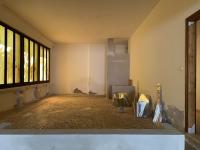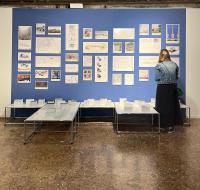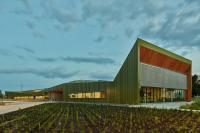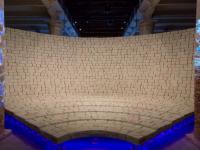Biophilic Super Yacht
e.g. Monaco, Monaco
As one of the innovative highlights of the Monaco Yacht Show, design studio 3deluxe launched a zero-carbon super-yacht, which is available for purchase as an NFT (digitally encrypted token) on the auction platform SuperWorld. To coincide with the Monaco Boat Show, the visionary yacht can be admired virtually against the backdrop of the Port of Monaco via the AR platform SuperWorld. Half of the funds raised from the sale will go towards the marine conservation organization Sea Change Project, founded by the producers of the Oscar-winning film My Octopus Teacher.
Major changes in seafaring
The challenges of climate change are forcing all industries to radically rethink the way they operate. In the technically ambitious world of yacht-building, there are some interesting developments that could pave the wave for achieving the goal of significant reduction in emissions from global seafaring. Some shipyards and technology companies have already made significant progress with the development of zero-carbon propulsion systems using fuel cells and are presenting the prospect of the first zero-carbon ships. The architecture and design studio 3deluxe, meanwhile, has many years of expertise in the design of expedition and cruise ships in various formats and is now presenting a design study for a zero-carbon super- yacht.
From farm to ocean: a floating Garden of Eden
In addition to the technological innovations and the ambitious outer design, the interior of the yacht also sets new standards. The interior concept breaks with many conventions of yacht design and corresponds to the visionary, nature- oriented philosophy of the project: A light-suffused, loft-like space forms a spacious room continuum made up of a greenhouse, lounge living space, kitchen, bar and vegetable garden. Luxury is rewritten entirely, with natural surroundings replacing acrylic glass and brass, while natural, healthy air replaces excessive air conditioning. Healthy food cultivated on- board, fresh fish from the ocean, relaxation, workouts, online business meetings, celebrations with friends – all this is possible within the inspiring ambiance of the paradisiacal biotope. The additional water needed for the plants is made available by the seawater desalination system, which is powered by the zero-carbon solar panels on the roof and the exterior. The master bedroom, meanwhile, is an open-topped space within the greenhouse – with a view of the starry night sky. The open spatial concept corresponds to the modern living concepts of a new generation of yachts: open, unconventional and close to nature.
Biophilic super-yacht
The simple, elegant exterior of the ship is characterized by a homogeneous, closed shape. Reduced and streamlined, the volume offers minimal resistance to wind and weather, and the hull merges seamlessly with the side façade right up to the highest point of the ship. Sensor-controlled louvers are integrated into the raised side walls to regulate the amount of light reaching the upper decks and can be closed during fast sailing and adverse weather. The protected flat roof is glazed and lets daylight into the interior, in addition to which, the side, sensor-controlled louvers also boast transparent photovoltaic cells, which provide power for air conditioning, light and the desalination system. The wheelhouse is unconventionally located at the bow, so the open sundeck behind it can extend seamlessly through into a generous one-space interior concept. At the open stern there is a saltwater pool and a small marina with direct access to the sea.
Private yacht and educative vessel in one
Ideally, the ship’s future owners will make it available for educational and training purposes during lay-up periods. The aim is to remove the elitist character of these kinds of private investments and to use the project as a communicative platform for discussion of the complex challenges of our time – as a modern, innovative training ship for new and inspirational approaches for young people, students and innovative start-ups, and as an unconventional venue for summits, conferences and think tanks. Ideally, this would compensate somewhat for the consumption of resources involved in its construction.
Gentle technologies for the heavy metal sector
The most attractive and progressive key technology for zero-carbon propulsion of cruise ships and yachts is currently considered to be fuel cells driven by hydrogen. The hydrogen required for the fuel cells can either be refueled or produced locally using methanol from emissions-free production. Methanol is more readily available and less complex to handle than hydrogen, and with one full tank of bio-methanol a fuel-cell yacht travelling at slow speed can still cover a distance of 1,000 nautical miles. This technology currently remains expensive, but with the appropriate maturity and greater prospects for marketing, it will become increasingly affordable for commercial shipping. The silent electric engines, which can be distributed decentrally throughout the ship, also avoid any outward noise pollution, while the interior of the ship would likewise be unusually quiet and free of vibrations. Yet it’s not only the operation, but also the construction of a yacht that needs to be as emission-free and sparing in its use of resources as possible. There are already some innovative steel and aluminum producers in Norway and Germany who are driving down CO2 emissions considerably through the use of renewable energy, optimized manufacturing processes and recycling, and similar optimization should apply to the entire manufacturing process of the yacht. After all, here too innovative yacht construction could be a driving force for an emissions-free future for the entire shipping industry.


















